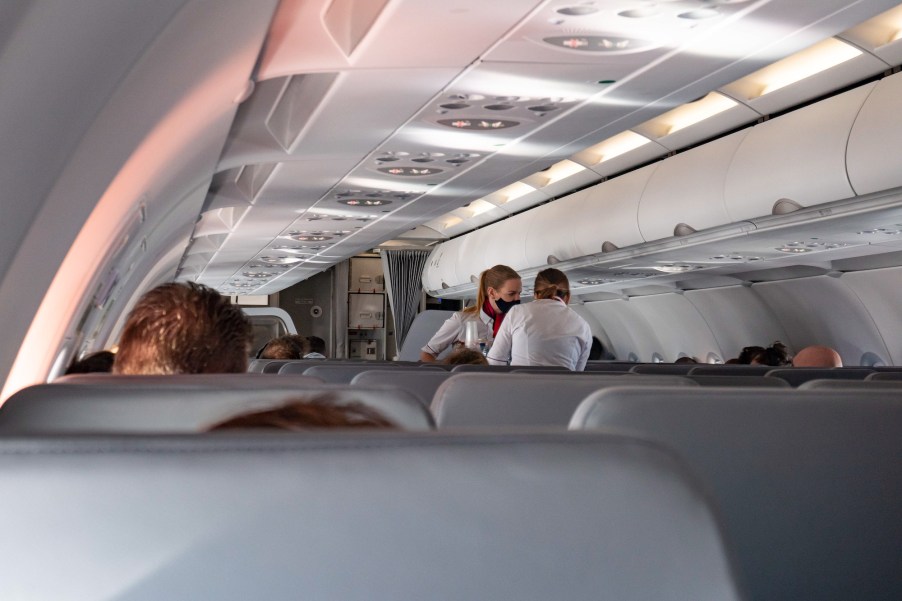
Flight Attendants and Airlines Demand Unruly Passengers Face Criminal Prosecution
What do you do when unruly airplane passengers besiege the skies? Airline unions and trade associations have called on the U.S. Department of Justice for help. Specifically, they have recommended that out-of-control passengers on airplanes be thrown in prison. This comes after widespread cases of disruptive behavior in the nation’s skies, making the mode of transport unbearable for flight crews and other passengers.
Air rage has become a trend on flights
Air travel can be hectic. Navigating long security queues, losing the seat lottery, occupying a middle seat, enduring delayed flights, or, worse, getting grounded for long periods can take a toll. If you’re like most passengers, you might plug in your headphones and get lost in your favorite music, a movie, or podcast. For others, the pressure makes them turn to the unfortunate phenomenon known as air rage.
Air rage is characterized by unruly and disruptive behavior that ranges from refusing to sit down, snapping at flight attendants, fighting other passengers, and even, in extreme cases, attempting to breach the cockpit or open the emergency exit doors. It’s often the flight crew that must bear the brunt of such behavior. Recently, such cases have become immense and unbearable for airlines, CNN reports.
The Federal Aviation Administration has received more than 3,000 reports of air rage this year. Of those cases, more than 2,300 involved passengers refusing to wear masks on board, which is a federal requirement. Some of the extreme cases reported include:
- January 7. An Alaska Airlines flight passenger traveling to Seattle from Washington, D.C., “pushed and/or shoved” a flight attendant during a routine check of passengers’ compliance with the masking regulation.
- January 10. A JetBlue flight passenger traveling to Los Angeles from Fort Lauderdale yelled at a flight attendant who reminded him of airplane transport rules after drinking his own booze and making a phone call.
- February 22. A Miami-to-LA JetBlue flight had to be delayed to kick out a passenger who had smuggled food, a headset, and champagne from first-class and then insulted and physically assaulted the flight attendant who returned the items.
Airlines and flight crew unions want stiffer penalties
The FAA has already increased passenger fines to between $9,000 and $32,750 to deter the increased air rage cases. It has also opened 487 investigations into commercial aircraft assault or interference. However, airlines and flight staff want more action. They have already requested the DOJ to intervene.
Gizmodo recently reported that 10 groups representing major airlines and flight crews recently wrote a letter to Attorney General Merrick Garland to ask that disruptive passengers face tougher punishment. The letter described the anarchic environment that characterizes many flights, thanks to unruly passengers.
What has triggered the spike in unruly and disruptive behavior on airplanes?
Ryan Martin, a professor of psychology at the University of Wisconsin-Green Bay, told CNBC there could be multiple triggers. However, Martin, who has studied anger for about 20 years, said displays of anger are often rooted in entitlement. “The more entitled you are, the angrier you get,” he said.
The professor also said that easily available examples of poor behavior, such as videos circulating online, could trigger other passengers to act out. He described the numerous videos circulated online last year showing people losing their cool and throwing “tantrums” in public as models for current flight incidents.
The other reason that Martin cited was increased anxiety after returning to travel, with most transport operations having taken a hiatus during the peak of the pandemic. However, he added that individuals who believe in violence to solve conflicts are likelier to turn violent.
As public transport operations return to normal, cases of unruly aircraft passengers could continue to rise. It remains to be seen whether the DOJ will take action. In the meantime, airlines and flight crews must continue devising tougher mechanisms for controlling passengers.


